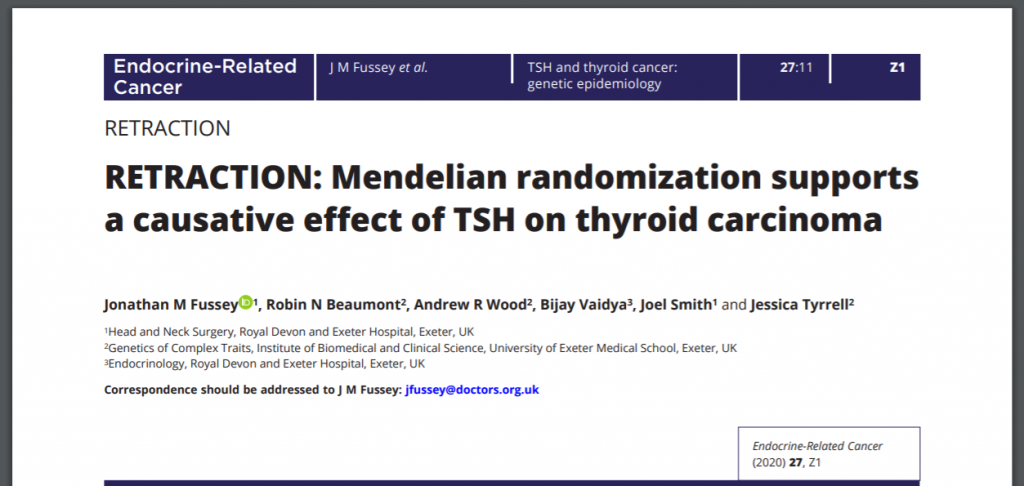
The authors of an October 2020 paper on the genetics of thyroid cancer are getting praise from the journal for retracting their article after learning that it contained a critical error.
The paper, “Mendelian randomization supports a causative effect of TSH on thyroid carcinoma,” had appeared in Endocrine-Related Cancer, a bioscientifica property.
Jonathan Fussey, a surgeon at Royal Devon and Exeter Hospital, and the first author of the study, told us:
The paper was retracted at the request of myself and my co-authors, as we became aware of another paper (published shortly after submission and publication of our own work) with similar methods to our own but with opposite findings. Whilst trying to understand the discrepancy in our results we re-ran our analyses and found a simple but important error which resulted in the beta-coefficients flipping for the associations we were measuring. We immediately contacted the journal to alert them to the error and requested that they retract our paper.
We have since triple checked our analysis and found that the results are similar to those reported by the other paper. We have been in touch with the journal and requested the opportunity to resubmit our work with the correct analyses and results. They have agreed to consider our amended manuscript.
Simon Buckmaster, the senior publisher of the journal, confirmed that account:
As Dr Fussey had requested the opportunity to republish the article with corrected analysis and results, the editors and journal team referred to the Republishing Retracted Content section of the COPE Retraction Guidelines and confirmed that this was possible. The editors confirmed that a new article should make clear reference to the retracted paper and explain why this analysis was now correct.
The authors were asked if the new article could be prepared quickly in order to simultaneously retract and republish as discussed in the COPE guidelines. It was agreed that the new article could not be prepared and reviewed quickly enough and that the priority was to publish a timely retraction.
A retraction notice, which was approved in advance by Dr Fussey on behalf of the authors, was published online on 23 October 2020.
That notice reads:
This article has been retracted by the journal.
The article has been retracted because Endocrine-Related Cancer was made aware, by the corresponding author J M Fussey, of an issue with the data analysis, which affected the results and conclusions of the manuscript ‘Mendelian randomization supports a causative effect of TSH on thyroid carcinoma’ published on 18 August 2020 in volume 27 part 10, pages 551–559. As such, and with agreement from all authors, the article has now been retracted. No further action will be taken against the authors of the article.
We wondered about that last line, which a reader might reasonably infer is meant to suggest that misconduct was at play. But Buckmaster said that wasn’t at all the case:
The journal team and editors acknowledge that, in hindsight, the final line of the retraction notice is poorly worded. The intention was not to imply any suspected misconduct on the part of the authors, but instead to state that the action taken by the journal was limited to the retraction of the article.
For the avoidance of any doubt, the ERC editors confirm that there was never any suspicion of misconduct on the part of the authors and that, to the best of our knowledge, no institutional investigation was needed or took place into the circumstances surrounding the flawed analysis. The ERC editors and journal team acknowledge and thank the authors for their efforts in acting quickly to correct the scientific record upon discovery of the flaw in their analysis.
The authors’ new article is currently undergoing peer review in ERC.
Fussey, for his part, added:
Having never had to retract a paper before, I assumed that the wording used in the retraction notice was standard.
Like Retraction Watch? You can make a tax-deductible contribution to support our work, follow us on Twitter, like us on Facebook, add us to your RSS reader, or subscribe to our daily digest. If you find a retraction that’s not in our database, you can let us know here. For comments or feedback, email us at [email protected].